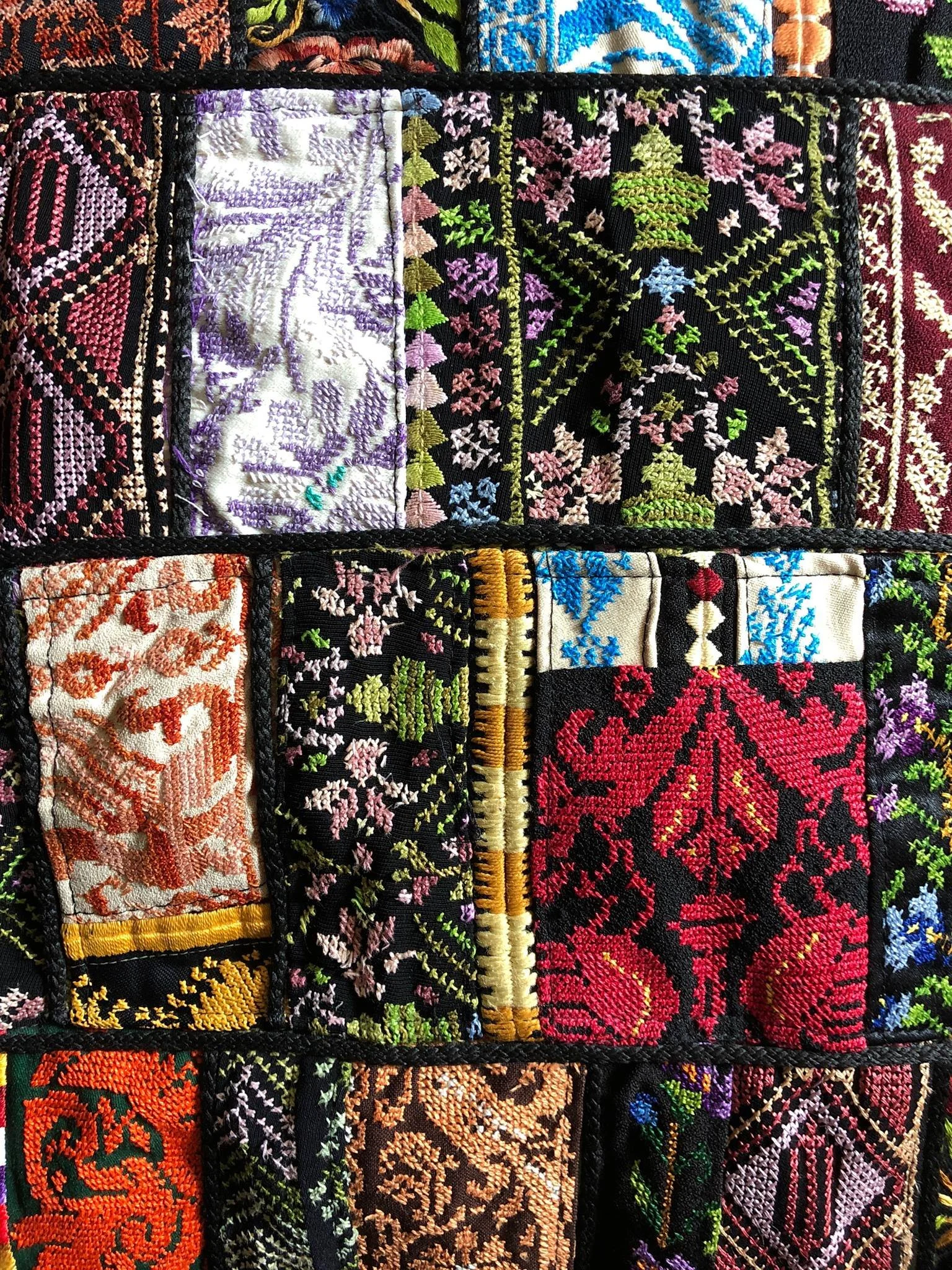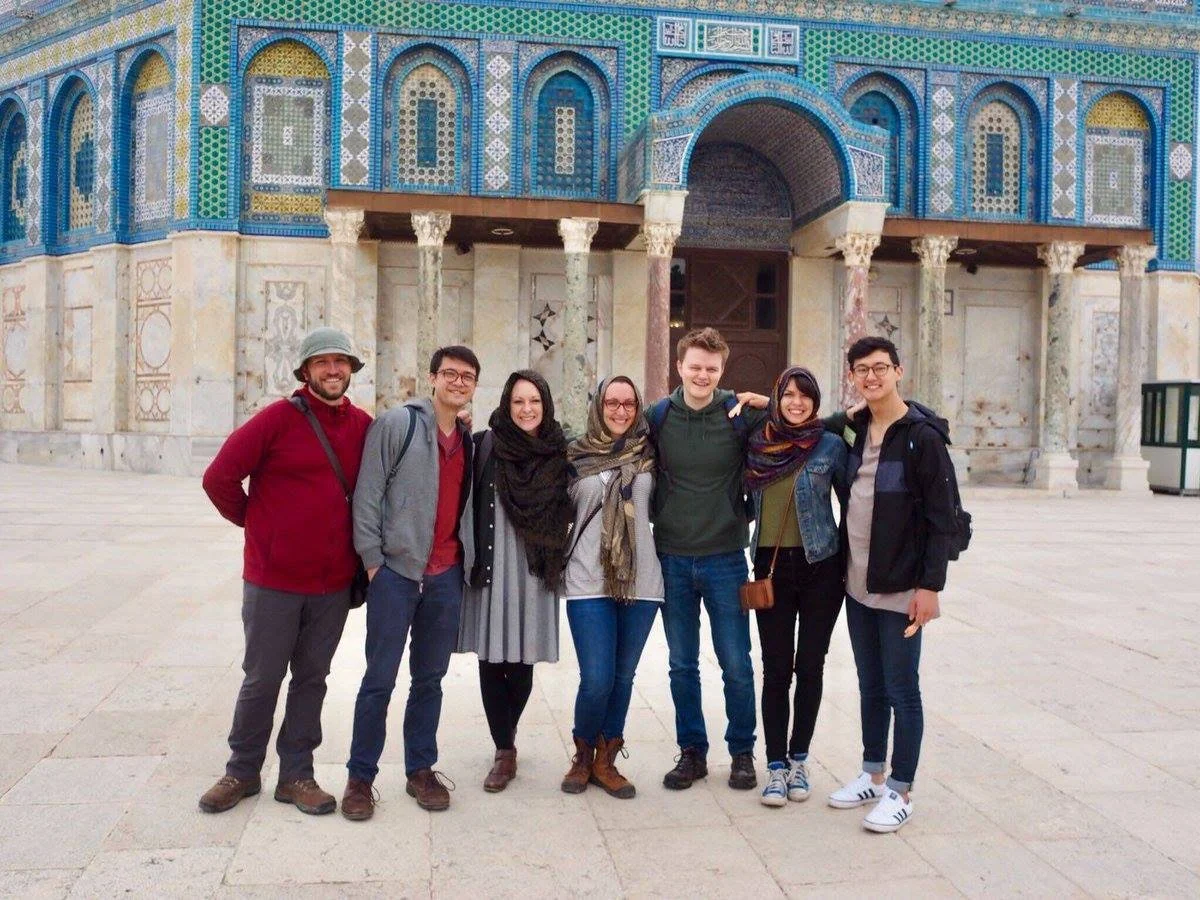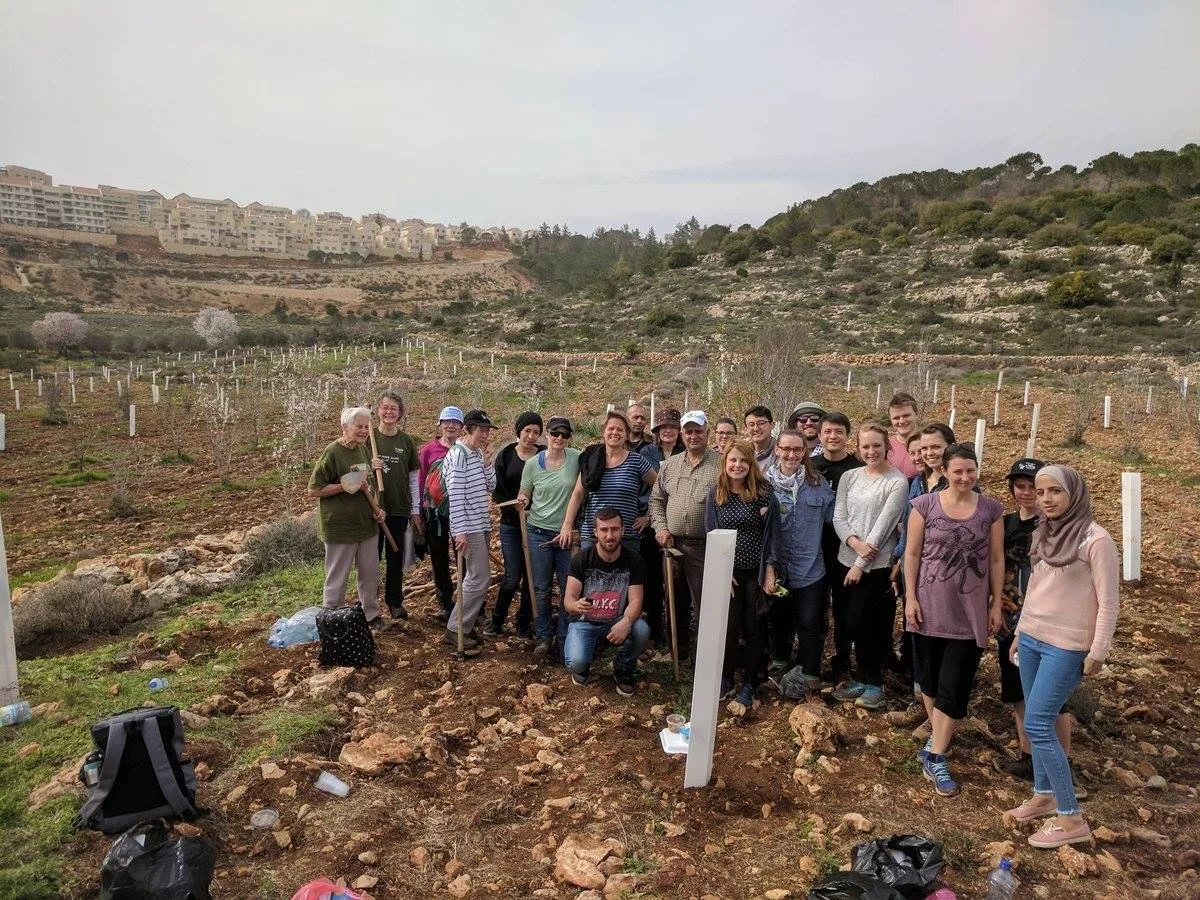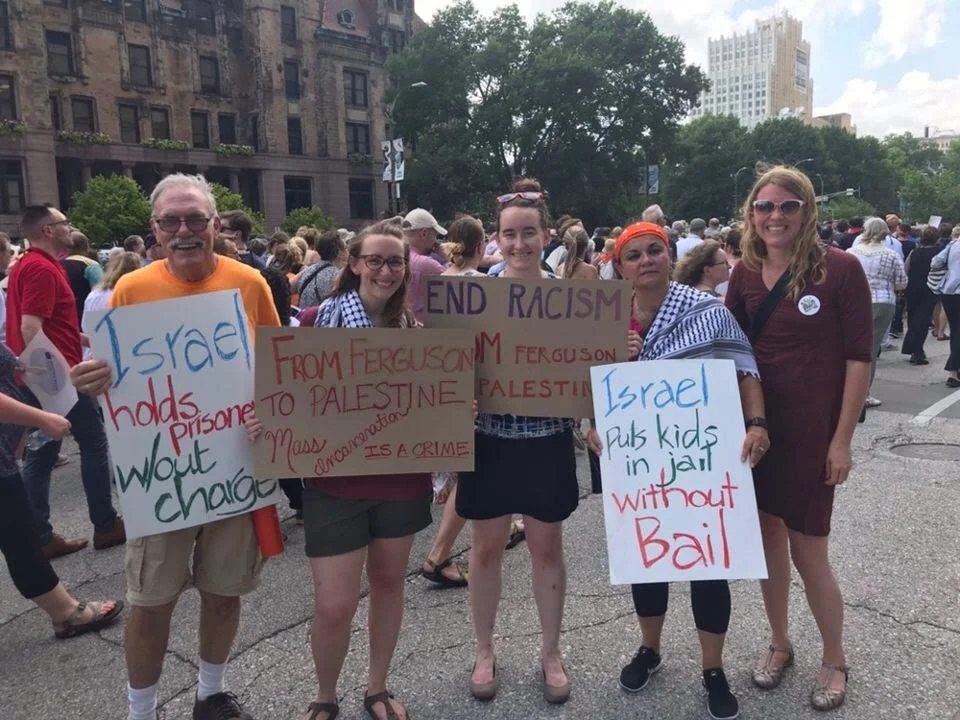-
![]()
Why Go?
When we arrived in Jerusalem, they welcomed us warmly. (Acts 21:17)
If you are able, travelling to the Holy Land can be a transformative experience. We are called to love God with all of our minds as well as with all of our hearts (Matt. 22:37); we should therefore be as informed as possible about the history and present-day needs of all people in this "cradle of our faith."
"Come, follow me," said Jesus (Mark 1:17). Visiting the sites of the Bible and walking where Jesus walked enriches our understanding of scripture and personal devotions. Learning about current realities facing people in the land of Christ's birth and developing relationships with the "Living Stones" (I Peter 2:5), can be life-changing.
We are called by our Lord to be active peacemakers and to work for justice among the poor and oppressed. Jesus said: “Blessed are the peacemakers, they shall be called children of God, (Matt. 5:9), and “The Spirit of the Lord is upon me…to proclaim release to the captives...and to let the oppressed go free” (Luke 4:18).
Given that the Presbyterian church has among the longest-standing Protestant mission efforts in the Middle East, if one is able, this is a Presbyterian calling.
-
![]()
Preparing to Go
Presbyterians understand Christian faith to occur at the intersection of the divine and the human, the ancient and the contemporary, and the prayerful and the just.
Pilgrimages should feed that faith and empower our lives of discipleship. Amid the many kinds of Holy Land trips that are available, we feel that faithful journeys have several common characteristics. We strongly encourage you to ensure your journey includes as many of these Six Elements as possible:
• Significant time visiting local Christians and church leaders as well as the holy sites
• Significant time in the Palestinian Territories (West Bank, East Jerusalem, Gaza) as well as in Israel
• Opportunities to meet Palestinian and Israeli peacemakers
• Opportunities to engage in interfaith discussions with a range of perspectives
• Opportunities to establish partnerships and relationships with congregations, organizations, and individuals in the regionUpon return, opportunities to work for peace and justice, particularly through faithful advocacy among congregations, community groups, and government
The first four objectives were emphasized in a resolution passed overwhelmingly at the 2008 General Assembly. Read the entire resolution here. (Paragraph 5 explicitly addresses travel.)
RESOURCES FOR DISCERNMENT AND PREPARATION:
+ "A Code of Conduct" created by the Palestinian Initiative for Responsible Tourism.
+ Avail yourself of the PC(USA)'s Israel and Palestine pages and connect with our mission co-workers in the region.
+ The people in our network are fantastic resources, eager to help you. Connect with us at info@theIPMN.org. -
![]()
Developing a Trip
If you have already chosen an organization to arrange your trip, we strongly encourage you to go over our resources in the Preparing to Go section. If you have not yet chosen an organization, do know that some are deeply involved in helping you discern the kind of trip you want to make, its purpose, and the kinds of places and people you want to visit. Others rely on the congregation to have a clear sense of these things beforehand. We find that the former approach is far preferable if your group of travellers does not already include people who are deeply experienced in travel to this region.
The people in our network are fantastic resources, eager to help. Connect with us at info@theIPMN.org.
TOUR GROUP SUGGESTIONS
This is a short list of organizations that members of our network have used and liked:
• Alternative Tourism Group
• Group Travel Directors
• JAI' Olive Tree Campaign (Keep Hope Alive)
• Wi'am Palestinian Conflict Resolution Center's Citizens Diplomacy ProjectMAXIMIZING BENEFIT TO LOCAL ECONOMY
Key issues here include the choice of tour organizers and local tour guides; hotels and restaurants; tour busses; and patterns of shopping, specially for wonderful local crafts products. Incorporating home stays in your visit can provide direct help to your hosts while providing wonderful insights into local culture and living patterns.Your intentional choices in each of these dimensions can dramatically increase the extent to which your trip will provide economic benefits to those most in need. Sensitive tour organizers will be taking these considerations into account in their planning; those considering going on a trip can especially encourage tour organizers to give Palestinian tour guides prominence in their trip planning.
-
![]()
Keep Hope Alive
Keep Hope Alive is a trip opportunity highly recommended by many IPMN members. Launched in 2002, the JAI' Olive Tree Campaign distributes olive saplings among farmers, sponsored by individuals, YMCAs, YWCAs, churches, church related organizations, human rights organizations, as well as solidarity and advocacy groups around the world, as an act of solidarity and support to help 'Keep Hope Alive'. The farmers supported are those who suffer from the various Israeli policies that put their land and property under the threat of confiscation, and the sponsored olive trees get planted in the occupied West Bank and Gaza Strip areas where olive trees have been uprooted and destroyed by the Israelis, or where fields are threatened to be confiscated by the Israeli military occupation, or where parts of the Israeli apartheid wall and settlements are constructed on part of the land.
"Security reasons" is the Israeli excuse given for the uprooting of trees, while in reality Palestinians' olive trees are destroyed for the expansion of Israeli settlements and bypass roads, the building of the Israel's apartheid wall, and by Israeli settlers' violence against Palestinian property.
Since the year 2001, Israel (through its military and settlers in the West Bank and Gaza) has uprooted, burnt and destroyed hundreds of thousands of olive trees that belong to Palestinian farmers and land owners, most of these trees have survived hundreds and thousands of years. We know that we will not replace the life of such olive trees, nor the stories and life lived around them, but we try to overcome such barbaric, irresponsible and careless practices by planting a sign of hope that future generations might than us for.
IPMN members occasionally host delegations with Keep Hope Alive. Email info@theIPMN.org to see if one of our members has an upcoming delegation planned.
-
![]()
When You Return
Travel to Palestine and Israel is always a mind-opening and transforming experience! What can you do with that experience, once you return home after a trip? Responding faithfully to the scriptural call that we seek peace and justice leads us to three challenges:
• Stay informed
• Stay in relationship with institutions and people in Palestine
• Stay engaged in advocacy within our denomination and beyondHere are some ways to put each of these into practice.
STAY INFORMED
Things change rapidly in Palestine and Israel! It takes work to stay informed. The mainstream media often fails to tell the whole story, particularly by under-representing Palestinian and progressive Israeli perspectives. Compensate for this by getting regular updates from other sources; some we have found especially helpful include:
• B’Tselem
• Churches for Middle East Peace
• Electronic Intifada
• Kairos USA
• Mondoweiss
• Sabeel’s Wave of Prayer
• US Campaign for Palestinian RightsSTAY IN RELATIONSHIP
When we keep in touch with groups or people whom we have met while on our trips, we make clear to them that they are not alone, that there are people around the world who understand, care about them and are praying for them. We "do mission in partnership" by walking with our partners, seeking to understand their struggles, and letting them know that we are concerned for them.STAY ENGAGED IN ADVOCACY
Locally, we can speak to our own congregations and Presbyteries or in local ecumenical, interfaith, or secular groups. We can write letters to the editors of local papers. We can seek to organize groups of concerned individuals at each of these levels. Nationally, we have an advocacy role in influencing the policies of our denomination, which has taken bold stands on these issues. Advocacy toward our own government can be done by meeting with our elected representatives and their staff, by phone, mail and e-mail communications. It can be done individually or in groups. Ecumenical Advocacy Days and Churches for Middle East Peace provide effective channels for doing this jointly with other Christians.






